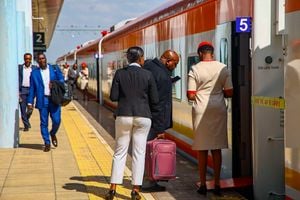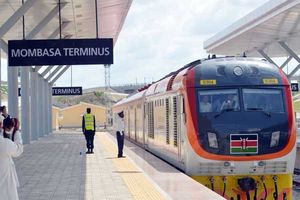
The High Court has reversed an earlier decision allowing a construction firm to attach the bank accounts of Kenya Railways Corporation over a debt of Sh525 million.
The High Court has reversed an earlier decision allowing a construction firm to attach the bank accounts of Kenya Railways Corporation over a debt of Sh525 million arising from a contract executed more than a decade ago.
While lifting the orders issued last month allowing Vee Vee Enterprises to attach the bank accounts of the corporation, Justice Alfred Mabeya stated that KRC was a state corporation and its bank accounts could not be seized. The Sh525,448,335 million was awarded to the firm during arbitration.
The Court of Appeal, noted Justice Mabeya, recently pronounced itself on the restriction against the property of state corporations, a decision that firmly binds the High Court.
“The accounts of the judgment debtor cannot be garnished. Other modes of execution have to be undertaken but not by way of attachment. Consequently, the orders of garnishee nisi made on September 23, 2024, are hereby lifted and set aside,” ruled the judge.
A garnishee is a legal process that instructs a third party to deduct payments directly from a debtor's wage or bank account.
Justice Mabeya had in an earlier ruling allowed Kenya Railways bankers – Kenya Commercial Bank and Equity Bank – to release Sh105 million and Sh19.6 million, respectively, to Vee Vee Enterprises through its lawyer Wilfred Mutubwa.
The judge had found the decree-holder’s claim unchallengeable and therefore allowed the 1st garnishee (KCB) and 2nd garnishee (Equity Bank) to pay all the money that stood in credit as of July 29, 2024, to the construction firm.
The firm was contracted in 2013 by KRC to construct and complete the relocation units and safety infrastructure at Kibera and Mukuru, in Nairobi, at a cost of Sh574.1 million plus VAT.
However, the total value under the contract rose to Sh1 billion and by the time the project was handed over to the Kenya Railways in 2016, the construction firm had been paid Sh822 million.
But the parties later fell out and the matter was referred to arbitration. In September, the court issued garnishee orders absolute against the funds of KRC to the tune of Sh124 million.
The court was of the view that KRC was not a government agency and therefore, provisions of the Government Proceedings Act were not applicable.
After hearing the application, the court allowed the freezing of the funds in two bank accounts held at KCB and Equity Bank.
The construction firm submitted that the unpaid VAT amounted to Sh133.4 million, with outstanding interest of Sh119.8 million and arbitration costs of Sh10.7 million, plus interest.
It was also contended that the process of settling the owed amounts had been ongoing but was not yet complete.
The court heard that the Transport ministry, through the National Treasury, was responsible for settling the debt since the Resettlement Action Plan (RAP) project received partial government funding.
Additionally, the Kenya Revenue Authority was considering waiving the accrued interest which would have significantly lowered the sums claimed by the firm. The taxman is pursuing its unpaid dues.
In his earlier ruling, Justice Mabeya said that it was evident where an organisation is not a government department but a corporation established under the State Corporations Act, the provisions of the Government Proceedings Act, cannot be invoked.
“In the present case, the judgment-debtor is a corporation within the meaning of the State Corporation Act. The government works through departments and the judgment-debtor is a corporation established under the Kenya Railways Corporation Act,” observed Justice Mabeya.
Consequently, the judge said KRC was not a government department and therefore it was not subject to the provisions of the Government Proceedings Act.
Revisiting a recent ruling against Kenya Railways in Mombasa, the judge noted that while he agreed with the construction firm’s lawyer that the decision of the Court of Appeal did not have a retrospective application, the ruling decision had a binding nature from the date of its pronouncement.











